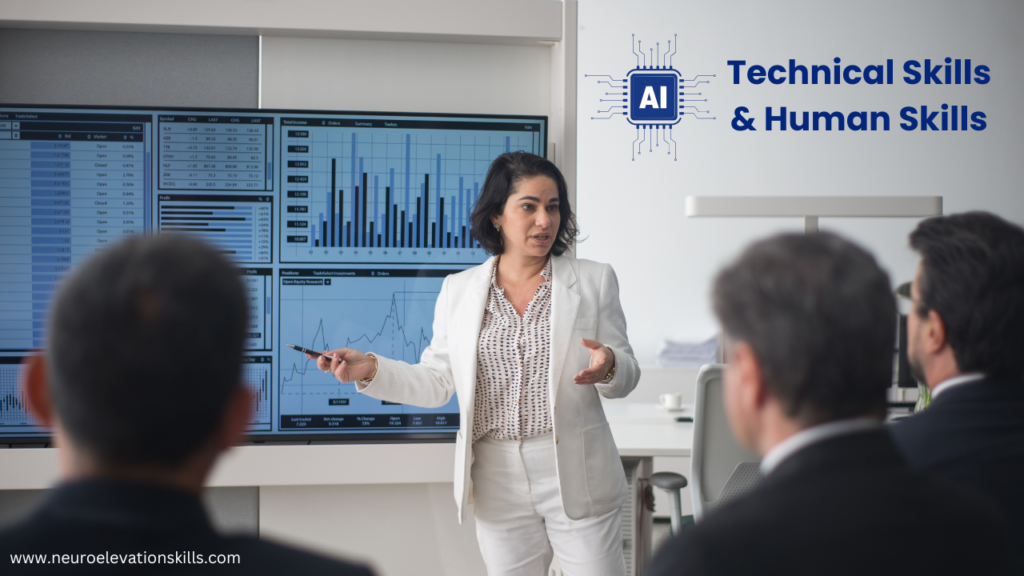The rapid integration of artificial intelligence (AI) into the workplace is fundamentally reshaping industries across the globe. AI is now a driving force behind automation, data analysis, and decision-making processes in businesses of all sizes. From customer service chatbots to advanced predictive analytics, AI technologies are being adopted at an unprecedented rate, streamlining operations and enhancing productivity.
A significant 64% of businesses believe that artificial intelligence will help increase their overall productivity, as revealed in a Forbes Advisor survey. This statistic underscores the growing confidence among companies in AI’s potential to enhance operational efficiency and effectiveness. By automating repetitive and time-consuming tasks, AI enables employees to focus on more strategic and creative aspects of their roles.
As AI continues to permeate various sectors, traditional job roles are undergoing significant changes. Tasks that were once labor-intensive and time-consuming are now being handled by AI systems with greater efficiency and accuracy. This shift has led to the automation of many routine jobs, particularly in manufacturing, administrative support, and even some aspects of white-collar professions like finance and law.
While this automation increases efficiency, it also raises concerns about job displacement and the need to acquire new skills to remain relevant in the job market. However, the impact of AI on the workplace is not solely about replacing human jobs. It is also about augmenting human capabilities and creating new roles that did not exist before.
The integration of AI is pushing organisations to reimagine job roles, blending technical skills with human-centric abilities like creativity, emotional intelligence, and leadership. It is apparent that the value of uniquely human skills cannot be replicated by AI. This evolution calls for a new approach to businesses, where continuous adaptability are crucial to thriving in an AI-driven world.
Essential Skills for Thriving in an AI-Driven Workplace
As AI continues to reshape the modern workplace, the skills required to thrive in this new environment are evolving rapidly. To stay competitive and relevant, leaders and employees must develop a balanced skillset that includes both key technical competencies and essential human skills.
Key Technical Skills for the AI-Driven Workplace
Technical proficiency is more important than ever in the modern workplace. Data literacy tops the list of essential skills, as the ability to understand, analyse, and interpret data is crucial for making informed decisions. Professionals who can effectively leverage AI-processed data will be better positioned to contribute to their organisations.
Additionally, a basic understanding of AI and machine learning concepts is becoming increasingly valuable, even for non-technical roles. Knowing how these technologies work and their applications can help them identify opportunities to implement AI in their areas of expertise.
Moreover, digital literacy is fundamental in an AI-integrated environment. This includes familiarity with a range of digital tools, platforms, and software that are essential for modern workflows. As AI becomes more embedded in daily operations, knowing these tools is crucial for maintaining efficiency and data security.
The Importance of Human-Centric Skills
While technical skills are crucial, the rise of AI also highlights the irreplaceable value of human-centric skills. As AI takes over routines, the demand for uniquely human abilities, such as critical thinking, adaptability, problem-solving and creativity is growing. When it comes to workplace performance, 91 percent of talent professionals believe that human skills are important for its improvement (LinkedIn).
Critical thinking is essential as it enables professionals to analyse complex situations, challenge assumptions, and make informed decisions. This skill is particularly valuable when interpreting data-driven insights provided by AI and applying them in a strategic manner.
Adaptability is another key human-centric skill, allowing individuals to thrive in rapidly changing environments. As AI continues to evolve, professionals who quickly adjust to new tools and processes will be better equipped to navigate transitions.
Problem-solving skills are vital for addressing unexpected challenges and finding solutions that AI alone may not identify. While AI can handle repetitive tasks, it often lacks the resourcefulness needed to resolve complex issues in a dynamic workplace.
Lastly, creativity plays a crucial role in developing innovative ideas and approaches that keep businesses competitive. While AI can process information, it is human creativity that drives the generation of new concepts and solutions. This human-centric skills ensures that organisations stay ahead in a competitive market.
Neuro-Linguistic Programming (NLP) as a Key Skill
NLP emerges as a crucial skill that enhances interpersonal effectiveness and personal development. It offers valuable techniques for improving communication, influencing others, and building personal resilience. As AI takes over technical tasks, the human touch becomes increasingly important, making NLP a key asset in maximising workplace success.
Effective Communication:
NLP provides tools for mastering effective communication. By understanding and applying NLP principles, professionals can refine their ability to convey messages clearly and persuasively. This is particularly beneficial in a workplace where collaboration and stakeholder engagement are vital. Improved communication ensures better teamwork, resolves conflicts more efficiently, and enhances overall productivity.
Influencing and Negotiation:
NLP also provides valuable strategies for influencing and negotiating. Understanding how to use language and non-verbal cues to guide conversations can enhance an individual’s ability to achieve desired outcomes. For example, NLP techniques can help professionals frame their messages more persuasively, build rapport quickly, and handle objections effectively. AI might handle data analysis, but human expertise is needed to influence stakeholders and drive strategic decisions.
Personal Resilience:
Beyond communication and influence, NLP contributes significantly to personal resilience and mindset. The ability to manage stress, maintain motivation, and adapt to change is critical in an AI-driven workplace. NLP offers techniques for shifting mindset, setting and achieving goals, and overcoming mental barriers. This is particularly relevant as professionals face the challenges of integrating AI into their workflows and adapting to new roles.
Enhanced Problem-Solving:
NLP also contributes to problem-solving and innovation by encouraging new ways of thinking and approaching challenges. As technology advances and traditional methods are replaced by AI, the ability to approach challenges from new angles becomes increasingly important. NLP provides valuable techniques that encourage fresh perspectives and drive forward-thinking solutions that keep their organisations competitive and adaptable.
Leadership and Team Dynamics:
For leaders, NLP offers valuable tools for managing teams and driving organisational change. Understanding NLP principles can enhance leadership skills by improving how leaders motivate, inspire, and guide their teams. As AI takes over operational tasks, strong leadership becomes even more crucial for guiding teams through transitions and maintaining morale.
NLP is a powerful skill set that complements the technological advancements brought about by AI. Its applications in enhancing communication, strategic influence, personal resilience, problem-solving, and leadership make it an essential tool for professionals to excel in an AI-driven workplace.
Integrating AI and NLP Skills for Career Growth
Integrating AI and NLP skills can be a powerful strategy for career and business growth. The ability to leverage AI while harnessing the interpersonal and cognitive strengths offered by NLP can set professionals apart. Combining these skills not only enhances individual performance but also positions professionals as valuable assets within their organisations.
Here are several situations illustrating how combining AI and NLP skills can drive career advancement:
-
Enhancing Client Interaction
Consider a scenario where you’re in a client-facing role, such as a consultant or account manager. AI tools can provide valuable insights into client behaviors and preferences, enabling you to tailor your strategies and recommendations more precisely. By integrating NLP techniques, you can improve how you present these insights and influence client decisions. The combination of AI-driven insights and NLP-enhanced communication skills can set you apart as a trusted advisor and problem solver.
-
Navigating Organisational Change
In a leadership or managerial position, you are responsible for guiding your team through organisational change driven by AI integration. Technical expertise with AI tools allows you to oversee the implementation and ensure that AI systems are effectively utilised. Meanwhile, NLP skills enable you to manage the human side of the transition. By using NLP techniques to address team concerns and communicate changes effectively, you can help facilitate a smoother transition and maintain team morale. This balanced approach demonstrates your ability to manage both the technological and interpersonal aspects of change, positioning you as a versatile and effective leader.
-
Improving Internal Team Collaboration
In roles that require cross-functional collaboration, such as project management or team leadership, integrating AI and NLP skills can enhance internal communication and teamwork. AI tools are used to streamline workflow management and monitor project progress, while NLP techniques improve how you facilitate meetings and ensure that team members are aligned. By combining AI’s operational efficiency with NLP’s focus on building strong relationships, you can create a more cohesive team environment.
-
Enhancing Customer Interactions
A role that involves frequent client interactions, like a sales person, integrating AI tools with NLP can greatly enhance performance. AI can provide valuable insights into customer behaviour and preferences, but effectively leveraging this information requires strong communication. Using NLP, you can tailor your approach to each client, respond empathetically to their needs, and influence their decisions positively.
Integrating AI and NLP skills offers a strategic advantage in various professional scenarios. By leveraging AI for technical insights and NLP for interpersonal effectiveness, you can enhance your career growth and lead successful projects. This combination of skills ensures that you stay relevant in an AI-driven world while also advancing in your career.
Future-Proofing Your Career with NLP
Future-proofing your career requires a strategic approach that blends technical expertise with essential human skills. Integrating NLP into your professional toolkit offers a strategic advantage by enhancing communication, influence, and resilience—key areas where AI alone cannot suffice. By mastering NLP, you position yourself to excel in an AI-driven environment and drive greater success in your role.
To help you develop these critical NLP skills, we are offering a comprehensive 7-day NLP for Business course. This event, Licensed Business Practitioner of NLP™, is designed to equip you with practical NLP techniques that can be immediately applied to enhance your professional performance.
This comprehensive program covers essential modules such as From Stress to Strength, which helps you manage pressure and stress effectively. It also includes Hidden Language of Leadership that focuses on non-verbal communication techniques for leading with impact. You’ll also explore The Ultimate Problem-Solving Model to tackle challenges innovatively, Persuasive Speech Patterns for verbal agility, and Stakeholder Engagement Excellence to build and maintain strong relationships.
Additionally, you’ll learn about Building Strategic Resilience to adapt and thrive through change, and Integration for Impact to apply NLP techniques effectively in real-world scenarios.
By mastering these modules, you’ll be well-prepared to integrate NLP techniques with your AI skills, ensuring you remain competitive and adaptable in the future of work. Take advantage of this opportunity to enhance your career and position yourself as a forward-thinking leader.







